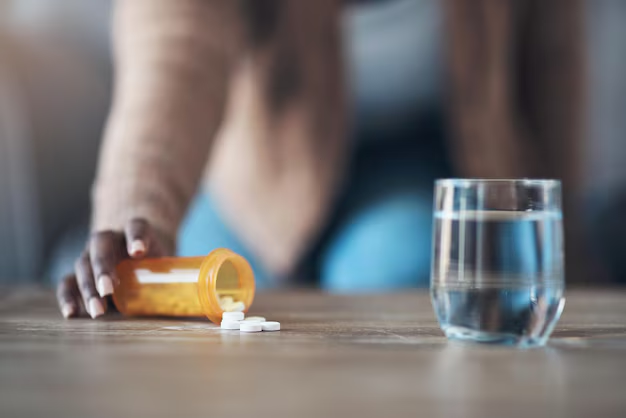Your Guide to What Medications Can Cause Bowel Incontinence
What You Get:
Free Guide
Free, helpful information about Incontinence FAQ and related What Medications Can Cause Bowel Incontinence topics.
Helpful Information
Get clear and easy-to-understand details about What Medications Can Cause Bowel Incontinence topics and resources.
Personalized Offers
Answer a few optional questions to receive offers or information related to Incontinence FAQ. The survey is optional and not required to access your free guide.
Can Your Medication Be Causing Bowel Incontinence? Here's What to Know
Bowel incontinence can be an inconvenient and distressing condition, one that might sneak into your life with something as innocuous as the medication you are taking. While medications serve crucial roles in managing health, certain ones may have side effects that affect bowel control. Understanding these medications and exploring supportive resources can help in managing this condition effectively.
Common Medications Linked to Bowel Incontinence
If you're experiencing unexpected bowel issues, your medication may be a contributing factor. Here are some types of medications that could be to blame:
1. Antibiotics
Antibiotics are vital in combating bacterial infections, but they can also disrupt your gut flora. This disruption may lead to diarrhea, which can increase the risk of bowel incontinence. Keep an eye on your digestive health if you're on a course of antibiotics, and consult your physician for probiotics to counteract these effects.
2. Antidepressants
Certain antidepressants, particularly selective serotonin reuptake inhibitors (SSRIs) and tricyclic antidepressants, can lead to changes in bowel habits. Their effect on smooth muscle function in the gut might be responsible for these symptoms.
3. Laxatives and Stool Softeners
Designed to ease constipation, these medications, when overused, can lead to dependency and negatively impact your natural bowel control. Moderation and proper use are key to avoiding adverse effects.
4. Metformin
Used primarily to treat type 2 diabetes, Metformin can cause gastrointestinal side effects, including increased bowel movements and diarrhea. If you're experiencing these symptoms, it's worth discussing with a healthcare provider.
5. Opioids
While opioids are effective pain relievers, they can lead to constipation and, paradoxically, also cause bowel incontinence. Managing and adjusting dosages under medical supervision is essential.
6. Heart Medications
Some heart medications, such as digitalis and beta-blockers, may alter bowel movements, occasionally leading to incontinence.
What To Do If Your Medication is Causing Bowel Incontinence
If you suspect your medication is affecting your bowel health, it’s crucial to speak with your healthcare provider. Never stop taking a prescribed medication without professional advice. Alternatives or dosage adjustments may alleviate symptoms without compromising the treatment’s effectiveness.
Managing Financial Aspects
Medical conditions like bowel incontinence often require additional treatments or dietary adjustments, which may lead to financial concerns. Here are some helpful financial assistance programs and solutions that you might consider:
- 💊 Medicare and Medicaid: These government programs can help cover medical expenses related to managing incontinence.
- 💰 Supplemental Security Income (SSI): For those with limited income, SSI can provide monetary support.
- 📊 Health Savings Accounts (HSA) and Flexible Spending Accounts (FSA): These accounts allow you to set aside pre-tax dollars for medical expenses, including treatments and medications for bowel incontinence.
- 🏠 Local Assistance Programs: Check if local charities or community organizations offer support for medical and related expenses.
- 🎓 Educational Grants and Resources: Various health organizations offer educational resources that can help you better understand your condition and manage it effectively.
It’s essential to find the right balance between your medical needs and financial wellbeing. Leveraging these resources can provide relief from both physical discomfort and financial strain, allowing you to focus on recovery and maintenance of your health.
What You Get:
Free Incontinence FAQ Guide
Free, helpful information about What Medications Can Cause Bowel Incontinence and related resources.

Helpful Information
Get clear, easy-to-understand details about What Medications Can Cause Bowel Incontinence topics.

Optional Personalized Offers
Answer a few optional questions to see offers or information related to Incontinence FAQ. Participation is not required to get your free guide.


Discover More
- a Patient You Are Caring For Uses Incontinence Briefs
- Are Incontinence Products Tax Deductible
- Are Incontinence Supplies Covered By Medicare
- Are Incontinence Supplies Tax Deductible
- Can a Bladder Infection Cause Urinary Incontinence
- Can a Kidney Stone Cause Incontinence
- Can a Urinary Tract Infection Cause Incontinence
- Can a Uti Cause Incontinence
- Can Constipation Cause Incontinence
- Can Constipation Cause Urinary Incontinence
